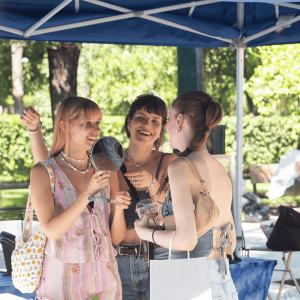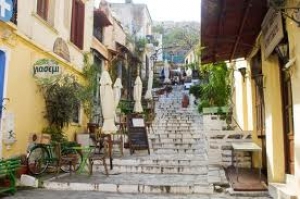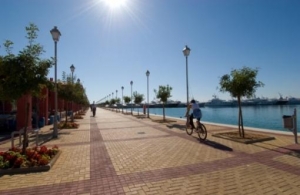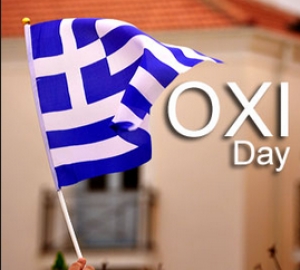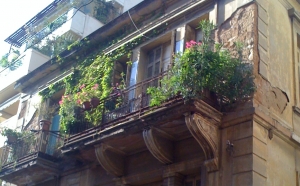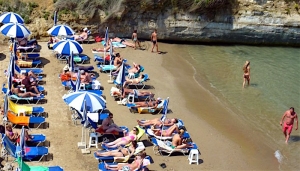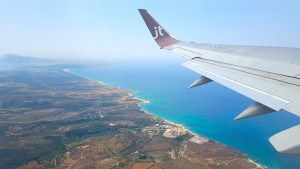XpatAthens
Summer Vibes At Zappeion: The Meet Market Returns!

This July’s Meet Market will showcase over 80 creators – many of whom are making their debut – offering locally-designed clothing, unique accessories, handmade jewelry, stylish home decor, beauty and wellness products made from natural ingredients, packaged foods directly from the Greek land, carefully selected kids’ items, vintage treasures, and much more.

Staying true to our motto “First a Meet, then a Market,” our program features continuous sets from beloved DJs, starting with laid-back afternoon tunes and peaking with dance beats by night. The music never stops!
Coming with the kids? No problem. We’ll have free activities for kids, including creative games, juggling performances, bubble shows, face painting, and plenty of surprises. And there's no shortage of food and drink: mouthwatering street food, pizza, burgers, and ice cream… and for the adults, we’ve got beers, wine, refreshing cocktails, and summer spirits.
Join us in an open, summer setting for strolls under the trees, relaxing on the grass, catching up with friends, doing some summer shopping, snacking, drinking and just enjoying the positive vibes. The Meet Market at Zappeion is the coolest stop of the summer – where the city comes to life just before it empties out for the holidays.

Aelia.You, Adelie Pengu, Anemuku, Bakayaro, circle of karma, DRU, Greek Sayings in English, Hazelnut Streetwear, Kadó Handmade, Ovary Gang, Nik’s, Sevi Waves, Siel, Xana, ΖΕΦΥR

Accessories:
Anakata handmade, INO Design, Favlos Kyklos, FORE, LePlou, Mavrosandals, Molkano, MoMo HandCrafted, Rimadi & Kardoulezen, The Mpini Project, Théla, Think Bricks, Trapeze

Aeikiniton, Happy Button store, Mamuka, I Love Bows
Jewelry:
ANV Handmade Jewerly, Argiro Handmade Projects, BSOD, Diesblon, Freyja Jewelry, Illimite Jewerly, Irini Kutiva Ceramics, Kilimi, Loveisall., LUSSU MARSO, MGeometric Designs, Mikrama, Mosaic Beadwork, Matharia, North & South Jewelry, NOXPIRIA, Pretty Little Things, Red Fox Stories, Sisyphus

Mind, Body & Soul:
Bee Naturalles, Christies, Hazel Natural Skincare, The Soaphouse, The Salve Project
Vintage & Retro:
King Kong Vintage, Lilian in Love, Memorabilia Lovers, MUNDA
Art & HomeDeco
Aethereal Ceramics, Blue Studio Ceramics, EleniPal Ceramics, Little Stone Studio, Meli Ceramics, Paperlocs., Redy., Sava Handmade Creations, Sporos.Wrapped in Art, Signature Project, STONED Design, Urban Muses
Tasting Corner:
‘Αγρια Νομή, Αpo Kardias Olive Oil, Aithra Premium Spirits, Οικογένεια Δασκαλάκη, Kakau Worship, ΣάΟΣ
Street Food & Drinks:
ALU.beer, Django Gelato, Grape Store, Falafeladiko, Fysika, Kykao Handcrafted, Neropistolo, Pizza Dough, Tarantino Burgers, The Meet Market Bar, Toul’s Brew

15:00 - 17:00: Rrose Sélavy
17:00 - 19:00: Pipidee
19:00 - 21:00: DJ Kiten
21:00 - 23:00: George Garavellos
15:00 - 17:00: djk_aka_zegas
17:00 - 19:00: mR GEE
19:00 - 21:00: dj kotétrataté
21:00 - 23:00: Zervas_Giorgos_tsxls
18:00 - 21:00 | Outdoor interactivities from Paizontas
19:30 - 21:00 | Juggling and Bubble Show from Fundastick Performing Arts
18:00 - 20:00 | Face-painting by Moutzoures
20:00 - 21:00 | Magic Show by Magic Tolto
Parallel Activities
Wine Tasting by Grape Store
Join us for an delightful wine tasting session featuring exquisite Greek wines in the serene Zappeion Garden, beneath the trees' shade. Savor a curated selection of Greece's finest vintages, including the most known but also rare local varieties, each telling a unique story of the sun-kissed vineyards and rich heritage. Enjoy the harmonious blend of nature's tranquility and the vibrant notes of the wines. Discover the unique flavors in every glass, surrounded by natural splendor in the festive vibe of the Meet Market.
Cost: 20€ / person
House Sitting
And oldie, but goodie from Jack...I’ve spent the past week house-sitting for a friend in Koukaki, in the shadow of the Parthenon. Part of the deal is walking the dog 3 times daily – a task which I don’t mind at all, much less given that my dog-walking path is the Dionisiou Areopagitou pathway around the Acropolis. I mean, how much better does it get – early morning, deserted streets, quiet – and all the dog-owners out for their morning jaunt around the great symbol of the city…
I never thought of Athens as a ‘dog owning city’. I stand corrected.
I’ve walked around the historic centre this week more times than I can count. I told my friends I’ve been doing laps around the Acropolis. It’s surreal. And completely ‘normal’ too. I think it’s great that such an important monument forms such an ‘integral’ part of day-to-day life here. Whether you walk around it, drive around it, look at it through a distant window – it’s always there. And for every tourist with map in hand, staring at the rock – there is another local, on her way to meet a friend for a catch-up.
Life in the centre of Athens – for my taste – is fantastic. Everything is just around the corner. The streets are busy with voices and activity. Nightlife is ‘just over there’. And parking is… well, parking is no issue when you don’t even need a car.
So with the Acropolis Museum in front of me, Makriyianni street behind me, I wait for the real estate agent to show up – it’s about time I checked out some apartments down here…
Until next time,
Jack
In this weekly space, keep up with ‘Jack’ as he navigates daily life in Athens… Anecdotes, stories, hits & misses, the good, the bad and, well, the rest…
Biking In Athens
The capital of Greece, with the joys of the mountain and the pleasures of the sea equally available, can really thrill the bikers. Mount the bicycle of your imagination and follow us on an enchanting trip around the beauties of Athens. Kids of all ages, set the wheels in motion… Take your family along and follow safe ways through parks and cycle lanes. Treat your spare time of nonchalance with fitness in the following suggested places...
- Park of Environmental Information and Sensitisation “Antonis Tritsis”.
- “Syggrou” grove in Kifissia
- The ex royal estate in Tatoi
- The Technical University’s park in Zografou
- Intermunicipal cycle track of the northern suburbs
Let history be your guide…
The longest pedestrian walkway is Dionysiou Areopagitou str. It starts at the Hadrian’s Arch; it goes past the Acropolis Museum and keeps on through Apostolou Pavlou str. to Thissio and Monastiraki and, at Assomaton square, it meets Ermou str. Take the latter and go as far as Gazi or Plaka.
Feel the energy of the surroundings: incomparable monuments of the Greek cultural heritage will set the backdrop for an unforgettable ride pas the Ancient Agora, the Ancient Dionysus Theatre, the Roman Agora. For a time journey back to the ages of the old times of Athens as capital of the Hellenic Republic, Plaka is the best choice.
Caressed by the sea breeze…
When you have cycled around the city centre but you are eager for more, go to the Athens Riviera and enjoy some ouzo after your ride. Our suggestions:
-From “Floisvos” marina to Eden beach
-From Fáliro to Glyfáda
-From the marina in Glyfáda to Kavouri
To read this article in full, please visit: Visit Greece
Greeks In New York To Celebrate Oxi Day
On October 28th, millions around the world will commemorate OXI (pronounced ō-hē) Day, a day honoring Greece’s courageous resistance during World War II. The day will be remembered on board the USS SLATER in Albany, New York with a brief program beginning at 9:00 a.m. The public is invited to attend.
In 1940 Mussolini delivered an ultimatum to Greece’s Prime Minister demanding the entry of the Italian army into Greece and Italian occupation of Greek territory. The Prime Minister refused. His response was quickly echoed by the people of Athens as “Oxi,” meaning “No.”
To read more, please visit greekreporter.com
By Ioanna Zikakou
Balcony Life In Athens
On the subject of washing, some people extend their washing machines onto it - others drag their living room furniture out there in the summer, turning it inwards to watch TV from the balcony... often Cd's can be found dangling off the (almost always) green awning that serves as both a cover from the sun and a cover from prying eyes (no "Friends" spying on you from their balcony across the way!), in order to reflect the sun and scare away the ever present pigeons.
Breakfast and dinner is often served out there - in fact, as mentioned: it is a real extension of the home. It helps if you've a big area and are not facing the main road, but even then it's great to utilise your balcony. Unless you live on the ground floor or in the basement, rarely does an Athenian home not have a balcony.
And if your even 'luckier,' like my friend, you can witness and hear everyday life going on around you - but maybe I draw the line at semi naked fat old Greek men in y-fronts, the Greek version of Ugly Naked Guy!
By Bex
lifebeyondbordersblog.com
Tips To Help You Learn Greek
1. Learn the alphabet and listen to people speaking. It is important to learn how to pronounce the letters in the alphabet and once you know this, you will have no trouble being understood or pronouncing words.
2. Learn basic grammar. Many language teachers plunge into grammar without teaching the simple basics or teaching a single word. Many people will agree that it is best to initially learn a few of the basic rules such as the ‘to be’ rule and focus on learning words and phrases - grammar will come later.
3. Read road signs. Practice your language skills by reading road signs. It is a great way to familiarize yourself with your surroundings but also to help you remember and recognize letters of the alphabet.
4. Read subtitles. Many tv shows and films on Greek TV are in English with Greek subtitles. Reading the Greek subtitles while listening to the film in English is an excellent way to learn new words.
5. Listen to Greek music. Greece has many genres of music from traditional to modern, listening to Greek music while you work or just having it on while you're at home will help you pick up new phrases, not to mention enjoying great songs!
6. Talk with the locals. Not only is this a great way to integrate and meet people in your local community, but practicing speaking Greek is probably the greatest way to learn the lingo. Spending some of your day interacting with people you meet at shops, on the street or on the bus, will help you learn pronunciation, word order, grammar, and everyday phrases.
Learning Greek can be fun ~ enjoy!!
To read more tips, please visit: GreekReporter
An App-y Summer
Zea - The Main Grain Of The Ancient Greeks' Diet
To read this article in full, please visit: Greece by a Greek
Spinach And Feta Turkey Burgers
“These are a big hit in the summertime when everyone is tired of the same old hamburgers and hot dogs. Serve with or without buns and your favorite condiments. I like to serve these with lettuce, tomato, and Tzatziki sauce!”
Ingredients
- 2 eggs, beaten
- 2 cloves of garlic, minced
- 4 ounces feta cheese
- 1 (10 ounce) box frozen chopped spinach, thawed and squeezed dry
- 2 pounds ground turkey

